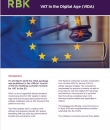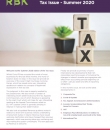The European Commission has described the EU VAT system as an “asset of the Single Market….removing obstacles that distorted competitions and prevented the free movement of goods.” However, the EU VAT system has struggled to keep up with the increasing globalisation of business and in particular with developments in E-Commerce.
In 2016, the EU Commission adopted an Action Plan on VAT to reboot the current EU VAT system to make it simpler, more fraud-proof and business friendly. Key elements of the EU’s VAT Action Plan have already been agreed and adopted. The EU proposes significant changes to the EU VAT system from January 2021 to move towards a definitive VAT system. This includes the proposed extension of the Mini One Stop Shop (MOSS) to “distance sales”. In the short term 4 “quick fixes” were introduced effective from 1 January 2020. These are considered below:
1. Harmonise call-off stock relief across the EU
Call-off stock relates to goods that are sent from one EU Member State to a warehouse or client’s storage facility in another EU State. One of the key requirements for call off stock relief is that the end customer is known before the goods are shipped to other EU State but the title in the goods remains with the seller. In the absence of call off stock relief the supplier would have to register for VAT in the member state of arrival, account for VAT on the acquisition of the goods and charge foreign VAT on the subsequent sale(s) as the goods are called off.
Call off stock relief allows the end customer to simply account for VAT on the reverse charge basis when the goods are called off. There is no requirement for the supplier to register for VAT in the other EU Member State. Whilst Irish VAT legislation already provides for call off stock relief, not all EU Member States provide the relief. A new Article 17A has been added to the VAT Directive that now requires all EU Member States to apply call off stock relief. This is a welcome development for Irish businesses that may hold Call Off Stock abroad.
2. EU cross-border chain transactions
A chain transactions is a successive supply of goods involving 3 parties (or more) and with only a single intra-EU movement of those goods. The goods must be transported or dispatched directly from the first supplier to the last business customer in the chain.
The new VAT rules introduce harmonised criteria for determining which of the transactions in a chain is the intra-community supply. Determining which party is making the intra community supply is important as it impacts on potential VAT registrations in other EU jurisdictions. These new rules are welcome in providing clarity on the circumstances in which registration for VAT in another EU Member State is required.
3. Harmonised documentation requirements
The EU VAT Implementing Regulation has been updated to specify what evidence will be required to support the application of the zero rate to an Intra Community Supply of goods. Previously, rules on the evidence required to prove a supply was an intra-EU supply differed between EU Member States.
In Ireland it is already a requirement to obtain satisfactory evidence that the goods have been removed from the jurisdiction. The quick fix harmonises and simplifies the regulations by introducing new rules that all Member States must comply with. This harmonisation gives a clear definition of what is satisfactory in all EU Member States. Suppliers must be able to produce two items of evidence from independent parties proving that a supply is destined for another EU Member State.
4. Mandatory VAT ID number verification for EU cross-border supplies of goods
Currently the zero rate can apply to an Intra Community supply even if the customer does not provide a valid VAT number issued by another Member State. From 1 January 2020 the zero rate will only apply where:
It was already a condition of zero-rating an intra-EU dispatch that you must obtain the customer’s EU VAT number and display this on the invoice. However, the new rules bring in the additional requirement that an intra-EU dispatch cannot be zero-rated if the supply is not included on the supplier’s EC Sales List for the relevant period.
These quick fixes apply to all EU Member States and are designed to simplify the VAT rules for B2B EU cross-border supplies of goods.
Return to "The Tax Issue - Spring 2020"


VAT in the Digital Age (ViDA) 516.89 KB
On 25 March 2025 the ViDA package was published in the Official Journal of the EU marking a pivotal moment for VAT in the EU. ViDA is a set of legislative reforms aimed at modernizing the EU's VAT system to better align with technological advancements and address challenges such as VAT fraud and the platform economy. The ViDA updates aim to create a more efficient and business-friendly VAT system, benefiting SMEs by reducing administrative burdens and compliance costs. Irish Revenue conducted a public consultation from October 2023 to January 2024 to gather taxpayer insights. The consultation emphasised the practical concerns, as well as proposals for real-time digital VAT reporting and electronic invoicing and it is expected that this will be considered when Irish Revenue publish related rules applicable in Ireland. The package will officially come into force on 14 April 2025 with implementation timelines extending into the 2030s.
Download
Irish VAT, UK VAT & Customs Considerations Presentation - RBK Bishop Fleming Swiftfile 1.66 MB
RBK, Bishop Fleming and Swiftfile presented at a webinar on 2nd March 2021 were they shared practical insights and provided guidance in relation to Irish VAT, UK VAT and Customs.
Download
Tax Issue - Summer 2020 137.61 KB
Whilst Covid-19 has occupied the minds of most businesses for the last three months, the world of taxation does not stop. In this issue we provide an overview of the recent High Court case involving Perigo, which has raised some very interesting questions in relation to concepts of legitimate expectative in Irish tax law. We also review a number of interesting recent determinations of the Tax Appeals Commissioners. We look at updated Revenue guidance notes in relation to short term business visitors undertaking employment duties in Ireland. Finally we provide a summary of some international tax developments that Irish corporates need to be aware of including the changes in Ireland’s transfer pricing regime with effect from accounting periods beginning on or after 1 January 2020 and DAC 6 reporting obligations.
DownloadOur offices are strategically located to service our market and are easily accessed from any location nationwide.
Termini,
3 Arkle Road,
Sandyford, Dublin,
D18 C9C5, Ireland
RBK Incorporating OMC O'Malley & Company Limited,
Upper Chapel Street,
Castlebar, Co Mayo,
F23 PF21, Ireland
RBK House, Irishtown
Athlone,
Co. Westmeath,
N37 XP52, Ireland
RBK Incorporating MCP Accountants,
Breaffy Road,
Castlebar, Co Mayo,
F23 DY67, Ireland
